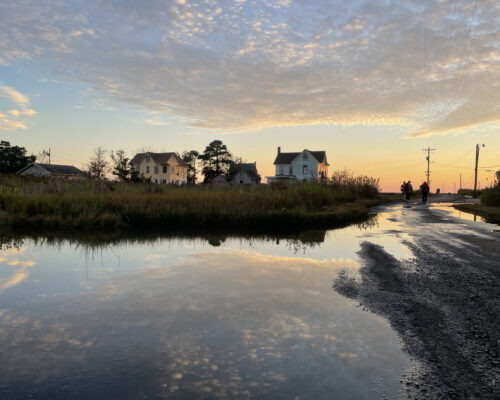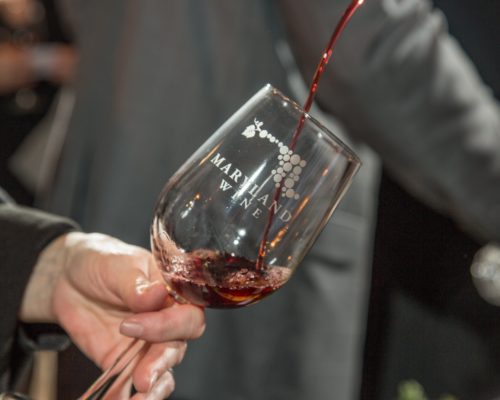Bob Hutchinson was born in 1936, the youngest of five, in the same house where his father was born in the village of Harborton on Virginia’s Eastern Shore. The Hutchinson home was the third house up from Pungoteague Creek on Harborton Road, which is the main access to the water, and the fish.
By the age of 14 he was an expert at poling a skiff along the marsh and channel edges to catch crabs to sell. He became known as the kid who knew where and how to go about catching the stripers, redfish, croakers, black drum and flounder that roamed these remote marshes, sloughs, cuts, oyster bars and surf.
His first steady job was at the weekly Eastern Shore News as a printer’s devil, the lowest position on the staff. It turned out that he had solid proofreading skills. The editor noticed him and guided him toward reporting and writing, where he found he had a knack. You might say that his innate ability to notice small things in the outdoors also made him a capable reporter who could gather and deliver the essential details. They put him on the local sports beat. There, in the news room, the other reporters naturally called him “Hutch,” and
it stuck.
In 1958 he married Pat Barnes from Greenbush on the shore, and she called him Hutch as well. Everybody did by that time.
In 1963, the publishers of the Norfolk-based Virginian-Pilot noticed his talent and reached out to bring him across the Bay to be their new outdoors editor. He and Pat packed up and took the Ferry from Cape Charles to Virginia Beach to set up a new life. For the next four decades, he was the primary source of fishing and hunting news and reports for the region, covering both sides of the Bay up to the Maryland line, the Eastern Shore of Virginia and the upper Outer Banks.
Hutch always considered himself a reporter, not a journalist. He enjoyed getting info straight from the source, and reporting it straight up without having to editorialize. His keen networking skills proved invaluable. He credits Claude Rogers, the first director of the Virginia Salt Water Fishing Tournament, as his fishing mentor.
As Hutch’s reputation for fishing and reporting grew, so did his opportunities for travel. Soon, everyone wanted to have Hutch along to enjoy the excursion and document the action. Popular articles about exotic fish caught in far-flung places began showing up in the paper. The paper sent him to Bimini to fish a tournament with a couple of guides—Bonefish Sam and his son Bonefish Jackson. To the delight of his readers, they won. Hutch also won a Canadian tournament in the cold blue waters near Prince Edward Island by catching an 845-pound Bluefin tuna. The fight was brutal on the wiry Virginia angler. “It’s the toughest physical challenge I’ve ever faced,” he recalls. After he landed the fish, he raised his voice to the sky and said, “Lord, don’t ever let me do that again.” He says that after that one fish, “I decided not to fish for bluefin tuna ever again.”
Hutch also covered regional sailing, the only assignments he “truly hated.” He also covered the hunting scene, and represented the sport very well. Like pretty much every Eastern Shore boy of that era, hunting was a standard rite of passage, and he enjoyed it. But given a choice, he would rather fish.
Early on at the Pilot he attended a presentation by the Maryland-based fly-fishing pioneer and author, Lefty Kreh. Lefty was demonstrating how to cast with a fly-rod for the distance and accuracy required for successful saltwater fishing. Hutch was fascinated, and went straight to a tackle shop and bought a fiberglass Pflueger fly rod and reel. He practiced with it every day until he could cast the length of his backyard. Then he moved into the street. At last, he was able to pop a cast that carried the entire 100-feet of fly-line down past his neighbor’s house. Pat saw him jumping around outside in uncontrolled exuberance and thought he’d been stung by a bee.
Fly-fishing became Hutch’s passion. He frequented the tropics for bonefish and tarpon, and fly-fished his home waters for stripers and red drum. He helped discover and develop a unique late-season tarpon fishery on the Eastern Shore. He is considered a pioneer of the Virginia tarpon game, but he will deny it if asked. The 18-foot Florida-style flats skiff he rescued and customized for the challenge was evidence of his fly-fishing dedication. After cleaning out the dirt and growth inside the derelict boat, he installed carpet on the decks to reduce noise, and a quick release sailboat jam-cleat for adjusting his anchor line. He’d hop up on its poling platform, and pole away the hours over the Eastern Shore and Florida flats, searching.
Hutch retired from the Pilot in 2001, but continued to write fishing reports and freelance articles for local publications from time to time. “The best thing about retirement,” Hutch said, “Is being able to go to back to the Eastern Shore any day I want.”
Claude Bain, the second director of The Virginia Salt Water Fishing Tournament, worked with Hutch for years. “Hutch is so important to me, as a friend, and for his significant contributions to sport fishing in Virginia,” said Bain. “He was part of the group that started the Salt Water Fishing Tournament. He was involved in promoting Virginia’s fishing and in conserving it long before almost anyone else. His writing, and his involvement in the tournament, put Virginia fishing on the map. He was also instrumental in having limits put on trophy red drum and stripers, long before anyone else thought of preserving fisheries for the future.”
Hutch’s two boys inherited their father’s nickname, of course. Pat recalls, “The phone would ring, I’d pick it up, and someone would ask to speak to Hutch. I’d always say ‘which one?’ But, for more than 40 years to thousands of readers, anglers and friends around the docks and marshes, there is only one.
—Kendall Osborne
Addendum, February 19, 2017: Hutch passed away quietly in his sleep this morning.



